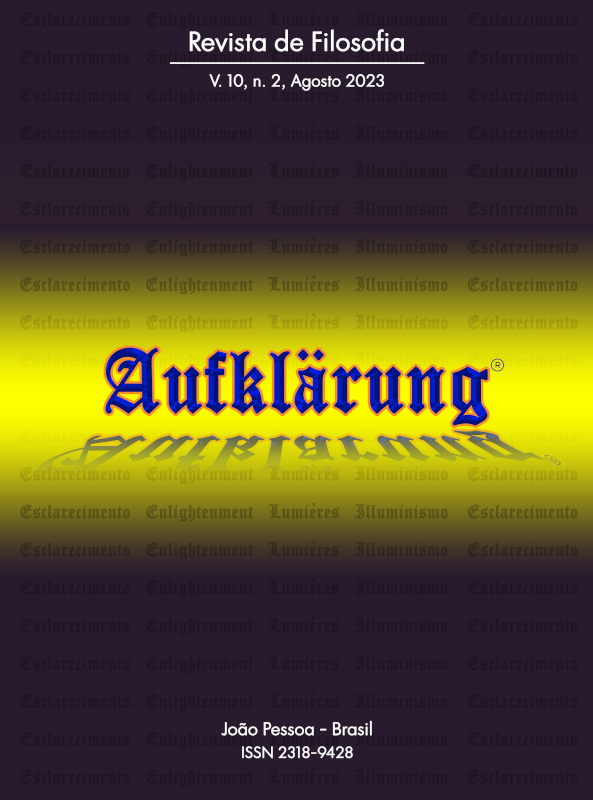Against Michael Sandel's communitarian critiques of Rawls' thought
DOI:
https://doi.org/10.18012/arf.v10i2.63424Keywords:
Rawls, Sandel, Comunitarism, LiberalismAbstract
This paper will investigate one of the main critiques of Rawlsian thought that emerged in the aftermath of the publication of A Theory of Justice in 1971, namely the communitarian critique by Michael Sandel. According to Sandel, Rawls starts from a radically disembodied subject, a unity of the self, from a human subject as a sovereign agent of choice, a creature whose ends are chosen rather than given. In Sandel's view, the original position is not a contract, but the realization of an intersubjective being.Against Sandel's reading, this paper will argue that the parties in the original position are not the affirmation of a liberal, individualized subject, because they are neither thought of as real persons nor as future persons, just as they do not represent who people really are or their true selfs. The idea is that justice as fairness is based on a normative conception of citizens as free and equal moral persons but does not presuppose any metaphysical conception of person. Thus, it will be argued that from the later works of A Theory of Justice – with the change in the Rawlsian perspective of people, highlighting the two moral powers (rationality and reasonableness), and the idea of full autonomy (belonging to the citizens of the well-ordered society) – the communitarian critiques of Rawls' thought fall definitively to the ground.
Downloads
References
BERCUSON, J. John Rawls and the history of political thought:the Rousseauvian and Hegelian heritage of justice as fairness.New York: Routledge, 2014.
DWORKIN, R. The Original Position. In: DANIELS, Norman (ed.). Reading Rawls. Critical Studies on Rawls’ A Theory of Justice. New York: Basic Books, 1975.
FORST, R. How (Not) to Speak about Identity. The Concept of the Person in a Theory of Justice. In: Philosophy & Social Criticism. 18(3-4), 1992, pp. 293-312. doi:.
FORST, R. Right to justification. Elements of a constructivist theory of justice. Translated by Jeffrey Flynn. New York: Columbia University Press, 2012.
FREEMAN, S. Rawls. Abingdon andNew York: Routledge, 2007.
GARGARELLA, R. As teorias da justiça depois de Rawls: um breve manual de filosofia política. Tradução de Alonso Reis Freire. São Paulo: WMF Martins Fontes, 2008.
GUTMANN, Amy. Liberal Equality. Cambridge: Cambridge University Press, 1980.
KRASNOFF, L. Kantian Constructivism. In: MANDLE, J.; REIDY, D. A. (eds.). A Companion to Rawls. Malden: Wiley Blackwell, 2014, pp. 73-87.
MAFFETTONE, S. Rawls: an introduction. Cambridge: Polity Press, 2010.
MANDLE, J. Rawls’s A Theory of Justice: an introduction. Cambridge: Cambridge University Press, 2009.
RAWLS, J. A Theory of Justice. Original edition. Cambridge and London: Belknap press of Harvard University Press, 1971.
RAWLS, J. A Theory of Justice. Revised edition. Cambridge: Belknap press of Harvard University Press, 1999 [1971].
RAWLS, J. Fairness to Goodness. In: The Philosophical Review, Vol. 84, No. 4, pp. 536-554, 1975.
RAWLS, J. Justice as Fairness. A Restatement. Erin Kelly (ed.). Cambridge and London: Belknap press of Harvard University Press, 2001.
RAWLS, J. Justice as Reciprocity. In: RAWLS, J. Collected Papers. Samuel Freeman (org.). Cambridge and London: Havard University Press, 1999b [1971].
RAWLS, J. Kantian Constructivism in Moral Theory. In: The Journal of Philosophy, Vol. 77, No. 9, pp. 515-572, 1980.
RAWLS, J. Political Liberalism. New York: Columbia University Press, 1996 [1993].
RAWLS, J. The Idea of an Overlapping Consensus. In: RAWLS, J. Collected Papers. Samuel Freeman (org.). Cambridge and London: Havard University Press, 1999c.
RAWLS, J. The law of peoples. Cambridge and London: Havard University Press, 1999d.
RAWLS, J. The law of peoples. In: Critical Inquiry, , pp. 36-68.
SALVATORE, Ingrid. Liberalism, pluralism, justice: An unresolved strain in the thought of John Rawls._In: Philosophy & Social Criticism. 2004; 30(5-6), pp. 623-641. doi:.
SANDEL, M. Liberalism and the limits of justice. Cambridge: Cambridge University Press, 1982.
SCANLON, T. M. Rawls' Theory of Justice. In: DANIELS, Norman (ed.). Reading Rawls. Critical Studies on Rawls’ A Theory of Justice. New York: Basic Books, 1975.
THOMAS, A. Rawls and political realism: Realistic utopianism or judgement in bad faith?_In: European Journal of Political Theory, 16(3), pp. 304-324, 2017. doi: .
VOLPATO DUTRA, D. J. A posição original como mediação entre Estado de Natureza e imperativo categórico: Rawls entre Hobbes e Kant. In: ethic@, Florianópolis, v. 13, n. 1, p. 112-140, jun. 2014
WERLE, D. L. O liberalismo contemporâneo e seus críticos. In: RAMOS, F. C.; MELO, R. S.; FRATESCHI, Y. (Org.). Manual de filosofia política. Para cursos de teoria do Estado e ciência política, filosofia e ciências sociais. 1ed. São Paulo: Saraiva, 2012.
WERLE, D. L. Vontade geral, natureza humana e sociedade democrática justa. Rawls leitor de Rousseau. In: Dois Pontos (UFPR), v. 7, p. 31-52, 2010.
Additional Files
Published
How to Cite
Issue
Section
License

This work is licensed under a Creative Commons Attribution 4.0 International License.
Journal general policy
1.This journal works under a Creative Commons License aplied to online journals. That icence can be read in the following link: Creative Commons Attribution 4.0 International (CC BY 4.0).
2.Accordingly to this License, a)the journal declares that authors hold the copyright of their articles without restrictions, and they can archieve them as post-print elsewhere. b)the journal allow the author(s) to retain publishing rights without restrictions.
Metadata Policy for information describing items in the repository
1. Anyone may access the metadata free of charge at anytime.
2.The metadata may be re-used in any medium without prior permission, even commercial purposes provided the OAI Identifier or a link to the original metadata record are given, under the terms of a CC BY license refered for the Journal.







































